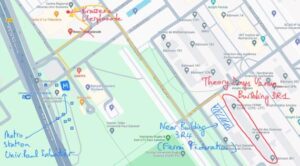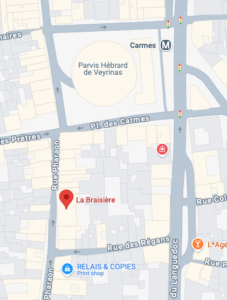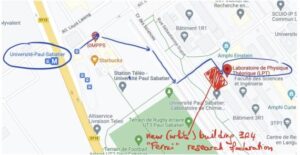Toulouse, Nov 27-29 2024
par – 22 octobre 2024
Organizers : M. Belkacem, P. M. Dinh, and E. Suraud
Aim and objectives
Following the tradition of the previous successful meetings that have started in 2009, the Theory Days workshop aims at stimulating constructive discussions, collaborations, and knowledge exchange among a selected group of theoreticians. This year, the 16th edition will be dedicated to Computational tools in physics : performances vs. reproducibility.
The development of computational codes for structure and dynamics of electronic systems is experiencing new directions of research in relation to the growing availability of artificial intelligence tools. Machine learning is now applied to numerous computational issues in physics and chemistry, such as for example structure optimization in clusters and molecules. The aim of this year meeting is to address this question in the specific context of dynamical problems, on the basis of existing computational softwares. To restrict the field, we shall focus on fully dynamical approaches allowing us to address dynamical scenarios beyond the domain of linear response. The meeting will thus try to summarize today’s situation in the field, by considering dedicated questions raised by dynamical codes.
The problem of reproducibility is becoming a major issue in computational science. The issue is becoming especially important because of the ever increasing complexity of the codes and as computations become bigger and bigger up to a point at which it may become too expansive to make systematic checks. It thus raises the key question of how large differences can be acceptable between results obtained from a given code using various “reasonable’’ parameters and/or various machines. There is a hardware aspect and a physical aspect. We shall try in the meeting to address both aspects on typical examples.
We plan to gather people from various groups working in this domain, mostly in western Europe. The workshop is intended to be a working forum, thus rather informal. The format will consist in a series of long detailed talks, typically 1 hour (40 mn talk + 10 mn for questions) focusing in particular on ongoing problems and open issues. We thus urge participants to prepare their talks in this spirit. Ultimately a most efficient organization would consist in having a limited number of talks per representative group in order to avoid doublings.
Scientific program and Venue
The meeting will take place from Wednesday November 27th to Friday november 29th, mostly in person, in the seminar room of the 3R1 building, 3rd floor on Wed and Thu, and in the meeting room 1 of the 3R4 building, 1st floor on Fri see map below or https://maps.app.goo.gl/3zHVtwu4uvv5VYSS7). Below is the scientific program and the zoom links.
Wed Nov 27th 2024
- 14:00 : David Hill, (Laboratoire d’Informatique, de Modélisation et d’Optimisation des Systèmes, CNRS, Université Clermont Ferrand, Clermont Ferrand, France), “Reproduce or Race ? Definitions, concepts, and a look at the tug-of-war between precision and speed in scientific computing”
- 15:00 : Jérôme Cuny, (Laboratoire de Chimie et Physique Quantiques, Université Paul Sabatier, CNRS, Toulouse, France), “Machine Learning based Inter-Atomic Potentials for Molecular Dynamics Simulations”
- 16:00 : Eleonora Luppi (Laboratoire de Chimie Théorique, Sorbonne Université, CNRS, Paris, France), “Quantum chemistry challenges the continuum : high-harmonic generation and photoionization for atoms and molecules”
Thu Nov 28th 2024
- 10:00 : Arnaud Legrand (Laboratoire d’Informatique de Grenoble, CNRS, Grenoble, France), “Numerical/software chaos and reproducibility issues in HPC”
- 11:00 : Florent Calvayrac (Institute of Theoretical Physics, Technical University of Wien, Austria), “speed up and accuracy solving partial differential equations on asynchronous parallel computers ; applications to tddft”
- 14:00 : Pablo Oliveira (Laboratoire d’Informatique, Parallélisme, Réseaux, Algorithmes, Distribués, Université Versailles Saint-Quentin-en-Yvelines, Université Paris-Saclay, Guyancourt, France ), “Verificarlo and stochastic rounding : exploring accuracy and reproducibility.”
- 15:00 : Nicolas Tancogne-Dejean (Max-Planck Institute for the Structure and the Dynamics of Matter, Hamburg, Germany), “Force-balance equation and TDDFT : towards new functionals and memory effects”
- 16:00 : Emilio Artacho (Ikerbasque Basque Foundation of Science, Bilbao, Spain), “Low-velocity anomalies in the stopping of protons and antiprotons in LiF”
Fri Nov 29th 2024
- 09:00 : Paul-Gerhard Reinhard (Institute for Theoretical Physics, University of Erlangen, Erlangen, Germany), “Photo-electron spectra of C60 : data and DFT description”
- 10:00 : Anthony Scemama (Laboratoire de Chimie et Physique Quantiques, Université Paul Sabatier, CNRS, Toulouse, France), “Developing libraries to increase performance, interoperability and reproducibility”
- 11:00 : Umberto De Giovannini (Università degli Studi di Palermo, Palermo, Italy), “Nonlinear Photoelectron Spectroscopy with TDDFT : From Atomic Systems to Solid-State”
- 12:00 : Concluding remarks
Practical aspects
Lunches The lunches will take place at the Esplanade restaurant on the campus, see map below (or https://maps.app.goo.gl/8xAuJnagm3Fxaw1K6) where the indications from the workshop venue or from the Metro Station Université Paul Sabatier are indicated.

Be cautious : google map shows the restaurant at a wrong location.
Dinners The two dinners are booked at the restaurant La Braisière (48 rue des Pharaons Toulouse), near the Carmes metro station : https://maps.app.goo.gl/G7NZh1JwCqTE5c9M7

Access to Toulouse
Airports
Toulouse airport is connected to major west European airports and hubs (Paris Orly and Roissy Charles de Gaulle, Munich, Frankfurt, London, Amsterdam) with regular connections by Air France/KLM, Lufthansa, British Airways for the major companies and also with connections by (Low Cost) Easy Jet. Plane provides by far the simplest access to Toulouse with reasonable fees for sufficiently early booking.
There is a shuttle to downtown (first stop at Compans Caffarelli, on line B of metro) every 20 mn (cost is 8 euros for a one-way combined shuttle/metro ticket, no special fare for a return trip). As soon as one catches the shuttle, it takes about half an hour to get to the University, thanks to the connection with line B at Compans Caffarelli station (direction “Ramonville-Saint-Agne”, get off at station Université Paul Sabatier).
Train
Central station is Toulouse Matabiau connected to line A of the metro and is connected to major French cities. To go to the university, take metro line A towards Basso Cambo, get off at Jean Jaurès (1 stop from Marengo-SNCF station), change to metro line B towards Ramonville-Saint-Agne and get off at Université Paul Sabatier. It takes about 20-25 minutes.
Directions to the meeting venue
The meeting will take place in the seminar room of the 3R1 building, third floor, in the Laboratoire de Physique Théorique.
To reach the venue, follow the instructions below :
- Take metro line B, direction Ramonville Saint-Agne
- Get off at “Universite Paul Sabatier”
- Exit towards the university
- Follow the indications of the map below.

